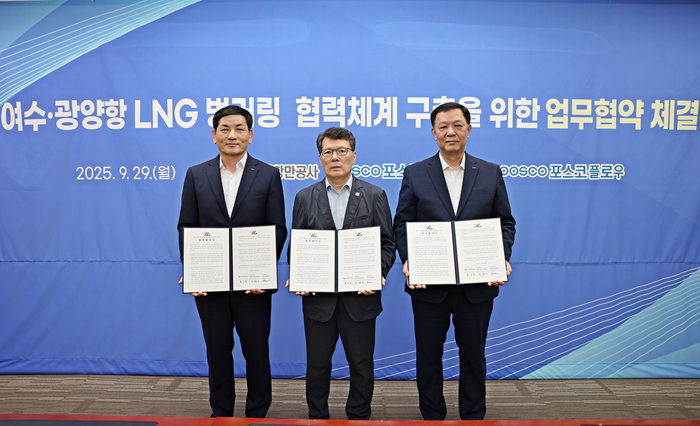POSCO International, POSCO Flow, Yeosu Gwangyang Port Corporation Sign MOU to Invest 12,500m ³ in 2027…1.33 million ㎘ storage infrastructure-linked group company capabilities…Securing Asia-Pacific Ship Fuel Leadership
 사진 확대
사진 확대 (From left) Min Chang-ki, head of POSCO International Energy Business Division, Hong Sang-pyo, vice president of Yeosu Gwangyang Port Corporation, and Kim Jong-pil, head of POSCO Flow’s raw material logistics division, who attended the agreement ceremony.
POSCO International will work with group companies and public institutions to supply liquefied natural gas (LNG), an eco-friendly ship fuel, in earnest. The strategy is to collect the group’s LNG value chain capabilities to grow Yeosu Gwangyang Port into a key LNG bunkering hub in the Asia-Pacific region.
POSCO International announced on the 30th that it signed a business agreement with POSCO Flow and Yeosu Gwangyang Port Authority (YGPA) on the 29th to establish a cooperation system for LNG bunkering at Yeosu Gwangyang Port. The agreement aims to establish an early LNG supply infrastructure for ship fuel at Yeosu Gwangyang Port in response to the surging demand for LNG propulsion ships due to the strengthening of environmental regulations by the International Maritime Organization (IMO).
According to this agreement, the three companies maximize synergy based on their respective expertise. First, POSCO International will oversee the entire process from LNG procurement to supply services using a storage tank and a bunker ring dedicated dock at Gwangyang LNG Terminal 2, which will be completed in 2026.
POSCO Flow, which has the group’s logistics expertise, is responsible for the construction and operation of 12,500㎥ LNG bunkering dedicated ships scheduled for delivery in 2027. Finally, Yeosu Gwangyang Port Corporation, as the port operator, is in charge of supporting related policies, licensing, and safety review, and enhancing the stability of the business.
Recently, the global shipping industry is rushing to switch from existing petroleum fuels to eco-friendly fuels such as LNG in line with IMO regulations. As a result, the number of LNG propulsion ships worldwide is expected to increase from 354 at the end of 2022 to 778 by 2027, and about 30% of new ships are expected to be LNG propulsion ships over the next decade.
In this trend, Yeosu Gwangyang Port, where 65,000 ships enter the port annually and handle 213 million tons of cargo, is considered the best LNG bunkering base. Potential demand from global shipping companies, including Japan’s three major shipping companies, has already been confirmed.
POSCO International plans to complete the bunkering-only pier at Gwangyang Terminal 2 by the third quarter of 2026, and secure the largest LNG storage infrastructure in Korea, totaling 1.33 million ㎘, including the existing Terminal 1. After that, from May 2027, the company will launch a ship-to-ship LNG bunkering service at ports in the southeast region. The plan is to secure stable demand through long-term supply contracts with global shipping companies.
“Posco International has a full value chain from exploration to supply based on Gwangyang LNG Terminal,” said Min Chang-ki, head of POSCO International’s energy business division. “Based on cooperation between the three companies, we will establish an efficient and stable LNG bunkering supply system.”